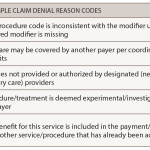Denials management is a growing issue in physician practices nationwide, and your practice could be losing tens of thousands of dollars yearly if you do not have a denials-management strategy in place.
Reports have shown that more and more physicians are turning to denials management to maximize their bottom dollar. The reason is that there is a 5–8% denial rate in most practices nationwide, and reports show 50% of denied claims are never refiled.1 In the denials-management process, 90% of denials are preventable, and 67% are recoverable. For example, a practice with a $1,000,000 revenue stream could potentially have $50,000 to $80,000 in lost revenue if they do not pursue denials.2 Given the magnitude of the numbers, a targeted denials-management strategy is crucial and, with a well-thought-out approach, should result in a significant revenue increase to the typical practice.
It is important to create a combination approach to effectively manage denials. Forming a denials-management team as well as a front-end claims-management team will help minimize denied claims. The workflow for each group should be specific and detailed.
The front-end claims-management team will be vital to the process. Members of the team should include coders, billers, and the medical records department. Their key responsibility is to make sure no claim is filed without verifying the patient’s name, date of birth, and insurance information and validating the diagnosis and procedure codes. Many claims are denied on the first round of submission due to incorrect spelling of name, no modifiers on procedure codes, or improper insurance information. Managing the charge entry and claims on the front end has great bearing on the magnitude of denials received in the office.
Creating a denials-management team is the other step in the process for reducing denied claims and increasing the financial health of your practice. The team should be proficient in analyzing data, creating reports, and understanding the claims-edit management system as well as the electronic data remittances and paper explanation of benefit denial reason codes. The team members should include representatives from patient accounts, the practice administrator or manager, and a coder. The denials-management team should have the main charge of researching the denials, creating the denials report, and developing denials-management solutions.
To have measurable success in managing your practice denials, you must have an efficient reporting system. Reports should be produced in a timely manner to respond to denials or rejections. Daily and weekly reports can be used to follow up on individual or group claims as well as monitor specific problem areas. Monthly reports will identify denial trends with payors, high-dollar claims, denial codes, and departments in your office.
Regardless of the approach you ultimately select, denial management is typically time and resource intensive to implement. If you make the commitment to implement a denials-management process using internal resources, be prepared to:
- Make decisions in advance and identify which payers you will target, how you will define your denial reasons, and what information system changes are needed.
- Prepare an implementation plan that details each of the activities needed to complete the timetables for each denial.
- Develop a plan to gather fee schedule information.
- Identify reports that will be used to monitor efforts and outcomes.
- Communicate the importance of the project to all clinical and nonclinical staff,
- Define the process and benchmark performance targets, timetables, and performance standards for employees charged with performing the daily charge entry, billing, follow-up, and reporting duties.
- Anticipate and budget the additional staffing and related expenses associated with the additional claims follow-up, management, and reporting duties.
There may be extensive opportunities for recovering lost revenue and analyzing performance in your practice. Creating a denials-management strategy will help you identify problem areas in your practice and create opportunities to eliminate them. Keep in mind that this is not a one-time process—consistent training and education is necessary to prevent unpaid claims.
For assistance with practice-management issues, contact Cindy Gutierrez, MBA, senior specialist of insurance and practice management at [email protected] or (404) 633-3777, ext. 310, or visit www.rheumatology.org/practice for additional resources on coding, billing, ICD-10, and health information technology.
Practice PEARLS
Prepare for ICD-10
The compliance date to transition from ICD-9-CM to ICD-10-CM is October 13, 2013. Although this date seems far away, there are specific activities that physicians should work on now for a smooth transition.
Create an ICD-10 team: This should include physicians, coders, and practice managers, depending on the size of the practice. The team should have specific responsibilities to assist the practice in preparation for ICD-10. Responsibilities include:
- Identify affected areas that currently deal with ICD-9 coding;
- Create an agenda for regular meetings and updates of ICD-10;
- Create a communication plan for the practice; and
- Establish an educational plan for key staff members.
For assistance on ICD-10 implementation, contact Antanya Chung, CPC, CPC-I, CRHC, director of practice management, at [email protected] or (404) 633-3777, ext. 818, or visit www.rheumatology.org/practice.
Join us for the ICD-10 Training Session—a State-of-the-Art postsymposium event—in Chicago on April 29. Visit www.rheumatology.org for more information and to register.


